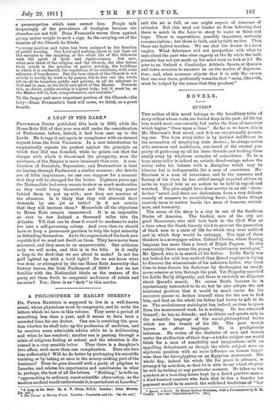A PHILOSOPHER IN HARLEY STREET.t
DR. PETER HARDING is supposed to live in a, well.known street, where physicians most do congregate, and to write the letters which we have in this volume. They cover a period of something less than a year, and it seems to have been a crowded time for our doctor. One son is revolving the ques- tion whether he shall take up the profession of medicine, and he receives some admirable advice while he is deliberating and when he has resolved ; another son is passing through a crisis of religious feeling at school, and the situation is dis- cussed in a very sensible letter. Then there is a daughter's love affair, with more than one complication. Does she love him sufficiently P Will he do better by prolonging his scientific training or by taking at once to the money-making part of the business? Then he goes himself with a party of pilgrims to Lourdes, and relates his experiences and conclusions in what is, perhaps, the best of all the letters. " Nothing," he tells us, "approaching to ordinary, exact scientific observation, as the modern medich1 world understands it, is carried out at Lourdes," • I Leal 411 the Dark. By A. V. Dicey, D.C.L. London : John Murray.
Ds. net.
1. The enter of Harley Street. London : Constable and Co. fee. ed. net.; and the air is full, as one might expect, of rumours of miracles. But this need not hinder us from believing that there is much in the Louree3 story to make us think and hope. There is superstition, possibly imposture, certainly commercialism ; but there is faith, and by faith we live. Then there are lighter touches. We see that the doctor is a keen angler. What fisherman will not sympathize with what he says about the parr who rises eagerly at the fly while the half- pounder has not yet made up his mind even to look at it P He goes to an Oxford v. Cambridge Athletic Sports at Queen's and takes occasion to reassure us on the matter of degenera- tion; and, when someone objects that it is only the cream that one sees there, profoundly remarks that " races, like lea, must be judged by the cream that they produce."






































 Previous page
Previous page